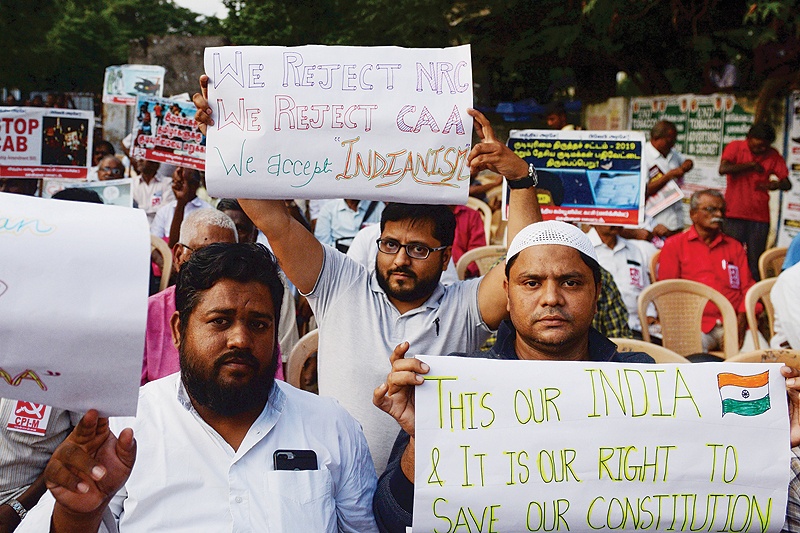
NEW DELHI: Fresh protests rocked India yesterday as anger grew over new citizenship legislation slammed as anti-Muslim, after six people died in the northeast and up to 200 were injured in New Delhi. The law fast-tracks citizenship for non-Muslims from three neighboring countries. Critics say it is part of Prime Minister Narendra Modi's Hindu nationalist agenda to marginalize the 200-million strong Islamic minority.
Modi yesterday denied this, tweeting that the new law "does not affect any citizen of India of any religion", while accusing "vested interest groups" of stoking the "deeply distressing" unrest. Rahul Gandhi, former opposition Congress chief, tweeted that the law and a mooted nationwide register of citizens also seen as anti-Muslim were "weapons of mass polarization unleashed by fascists".
The UN human rights office said last week it was concerned the law "would appear to undermine the commitment to equality before the law enshrined in India's constitution", while Washington and the European Union have also expressed unease. Yesterday, fresh protests took place including in Chennai, Bangalore and Lucknow, where hundreds of students - most of them Muslims, television pictures indicated - tried to storm a police station.
The northeast, where even allowing non-Muslims citizenship is opposed by many locals and which in recent days has been the epicenter of protests with six people dead, also saw fresh demonstrations. Authorities there in Assam's main city Guwahati lifted a daytime curfew but night-time restrictions remained, as did internet curbs. Ten people remain in hospital with gunshot wounds, while 190 people have been detained. "The curfew is from 9:00 pm to 6:00 am," Assam finance minister Himanta Biswa Sarma said.
In the east in Kolkata, capital of West Bengal, more than 10,000 people took part yesterday in a march led by state premier Mamata Banerjee, a firebrand Modi opponent. Banerjee told the crowd that the law would be implemented in her state "over my dead body", Indian media reported. "India is being divided," said Meera Hajra, a protester in Kolkata. State police said they fired tear gas to disperse hundreds of protesters elsewhere after they threw stones. More than 350 people were detained.
No major incidents were reported nationwide by yesterday evening, although several metro stations were closed in Delhi as demonstrations there continued for a second day. On Sunday evening rioters torched vehicles and police with batons fired tear gas and charged protesting students before storming the Delhi's Jamia Millia Islamia university. The university's vice-chancellor Najma Akhtar said yesterday that 200 people were injured but police put the number at 39 students hurt with 30 officers also injured, one of them critically.
"It is not expected of the police to enter the university and beat up students," Akhtar told a news conference. Students said police fired tear gas and windows were broken in the library. They ducked under desks and switched off the lights as advised by teachers. Hundreds of people gathered outside the New Delhi police headquarters to protest against alleged police brutality and the detention of students.
Police spokesman MS Randhawa said that four buses, 100 private vehicles and 10 police bikes were damaged, and that officers exercised "maximum restraint, minimum force" despite being "provoked". He denied some media reports that police opened fire. News channel NDTV reported that two people were in hospital with bullet injuries. The clashes prompted university students to demonstrate elsewhere including in the southern state of Tamil Nadu and in Bangalore.
"I want to make it clear, nobody is scared. Like people in Hong Kong are protesting, in Chile they are protesting, and they are not scared," student Bhumika Saraswati told AFP in the capital. Fellow student Shree Kumar said that the citizenship law was "ag
ainst the Muslims. It's against the ethos of India. It's against the secular ideas of India."
Protests were held in Mumbai's Indian Institute of Technology and Tata Institute of Social Sciences overnight and yesterday and more were planned at Bombay University and in the southern city of Bengaluru later in the day. Some Bollywood celebrities like actress Konkona Sen Sharma, and directors Mahesh Bhatt and Anubhav Sinha, also criticized the police action on Twitter and called on others to speak up. "We are with the students! Shame on you @DelhiPolice," Sen Sharma tweeted.
Authorities in Uttar Pradesh state cut Internet access in some parts following clashes between demonstrators and police in Aligarh on Sunday that saw 21 people arrested, authorities said. On the same day, Modi said the citizenship law is "1,000 percent correct" and that Muslims from Pakistan, Bangladesh and Afghanistan are not covered because they have no need of India's protection. Modi blamed the Congress party and its allies of "stoking fire", saying those creating violence "can be identified by their clothes" - a comment interpreted by some as referring to Muslims.
Modi has said Muslims from Pakistan, Bangladesh and Afghanistan are not covered by the law because they have no need of India's protection. Ashok Swain, a professor at Sweden's Uppsala University said that the scale of the protests had caught Modi's government off guard. "This certainly will add pressure on the regime when the economy has failed," Swain said. - Agencies









